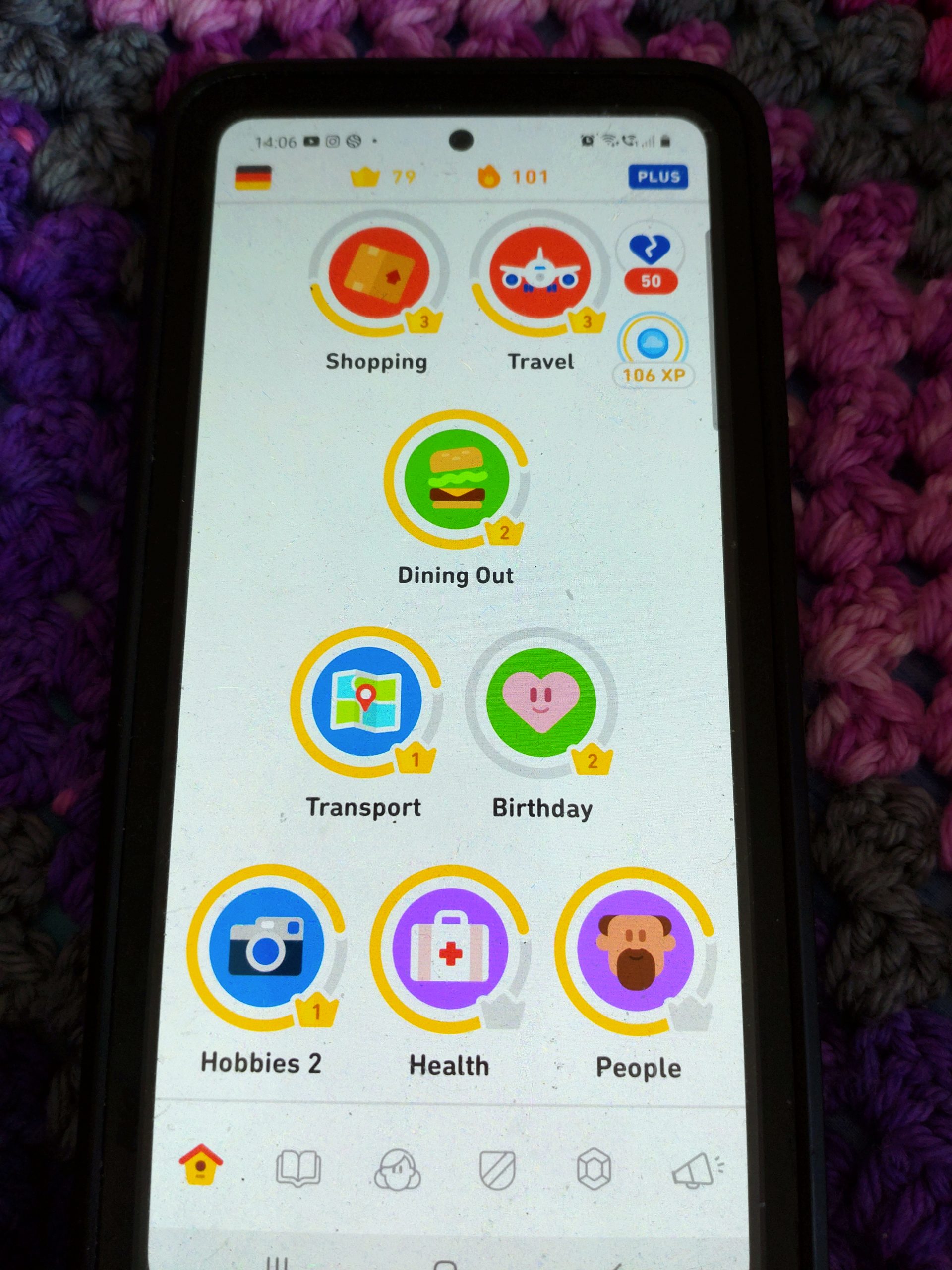
-
By:
- Discovery Languages
- No comment
- Tags: duolingo, gamification, german, language, learning
The Duolingo language learning app review
There are lots of apps available to help you learn languages. One that I have tried recently is Duolingo, the app with the green owl. www.duolingo.com/learn
Duolingo is free (you have to watch adverts and you can only make a certain amount of mistakes before you have to wait to play again) or paid (£90/year with up to 5 users and unlimited mistakes). I started with the free app and then moved to the paid version after three weeks of watching a lot of adverts. I have family & friends on my account so between 5 people, it’s quite a good deal. Everyone can study whatever language they choose. I chose German.
Duolingo is on a mobile or your computer and it is split up into lessons at different levels. You must get all of the parts to a lesson correct before you move on to a new lesson. Speaking, listening, reading and writing are all tested.
I think assessing speaking on an app is really difficult- sometimes the app says I have pronounced something really well when I haven’t (and vice versa). There’s no substitute for a real teacher here I think. But I do like the repetition and that I am trying to speak- as often that’s the part that people get nervous about.
There are quite a lot of writing tasks. Sometimes I misspell a word, and Duolingo says its ok, other times it says that it’s wrong. My autocorrect has learned some of the German spellings now and this helps me. The tasks flip between being in English and in German so it’s not worth changing the keyboard over to ENG or GER keyboards each time.
Each lesson has reading in it and in German, there are also short stories to read and answer questions about (this isn’t available in every language). Listening is also tested in each lesson.
Duolingo uses a variety of different voices, and some of these have changed over the time I’ve been using it (100 days) masculine, feminine, young and old. There is a childlike voice (Junior) and the moody teenager (Lilli) which I find rather annoying but on the whole, the voices are ok.
For Duolingo users over 13, there are leagues and you have the possibility of following people. Duolingo shows statistics that claim if you are more likely to keep learning if your friends are too. The leagues provide a challenge for people who like that although apparently, getting to #1 in the Diamond league is almost impossible I hear. I find the leagues helpful to motivate me to not get demoted back to the previous league.
Duolingo reminds you everyday to complete a lesson to maintain a “streak” -an unbroken run of doing a lesson everyday, which can help if you have forgotten and it’s getting towards the end of the day (which is 11pm UK time as Duolingo is based in the EU). Little and often is said to be the best way to fit language learning around the rest of your life and Duolingo really helps you with this.
Overall thoughts. I started with Duolingo for solidarity with my youngest daughter and to help improve my intermediate German. I started right at the beginning-even though I could have skipped the earlier levels. Why? When I learned German as a beginner, “everyone” said not to worry about the gender of the nouns, just start speaking. The problem is as you progress in the language, it’s very difficult to say anything correctly if you don’t know what gender the noun is. Yes, making mistakes like this is forgiven by any German speaker, but that’s not the point. Eventually I would like to take another German exam so the more accurately I can speak and write, then the better. I feel that Duolingo repeats things so often then you begin to learn by rote, which is in fact, how you learned words yourself as a child. I have learned more noun genders so this can only be a good thing.
As I know all of the grammar introduced so far, this is fine for me but I wonder if it would be confusing if you were learning from scratch. Duolingo isn’t a one-stop-shop for language learning but as part of a comprehensive approach (self-study, teacher led groups, conversation classes etc) then I would definitely recommend it.
If you like the gamification approach to learning a language and increasing your vocabulary, then try this.
Similar to Duolingo is Babbel, which is ~£50 for a single user for one language for a year.